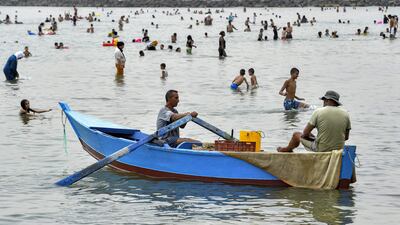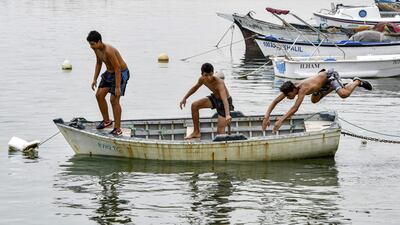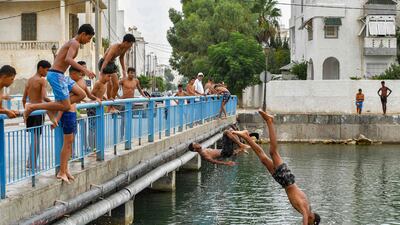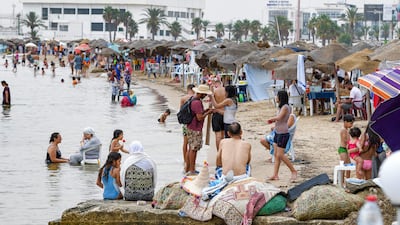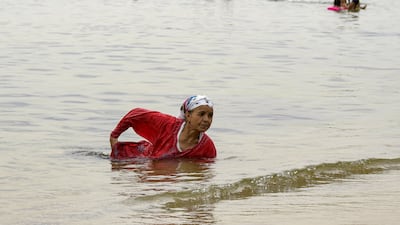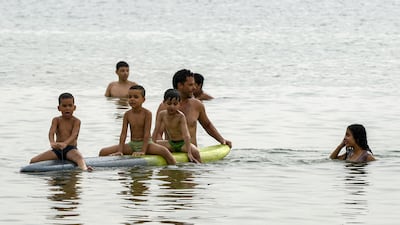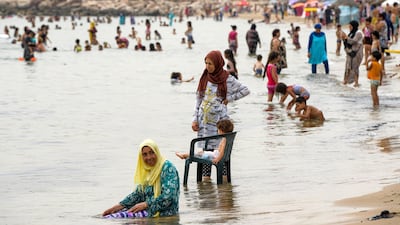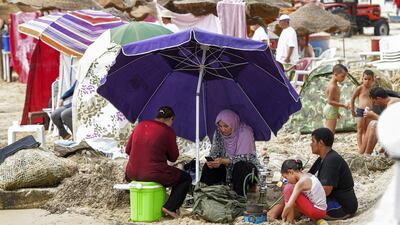As the mercury inched its way towards 47ºC on Monday in Khadhra, a small village in Tunisia's central Kairouan governorate, Afaf, a mother of four, could only lie still in the shade and wait for the heat to break. Her husband, a day labourer who works in the fields around the village, had just returned from hours in the scorching heat picking melons.
"We don't even have a fan," she said, soaked in sweat.
Her family are among the millions of Tunisians facing a crippling heatwave without the means to stay cool. This week, cities and towns across the country reported record-breaking temperatures of nearly 50ºC while wildfires raged across the north-west.
A damning new report on climate change from the UN said heat crises like these would continue. Warming across the Mediterranean will be about 20 per cent higher than global averages in the decades to come, the report said.
The assessment from the Intergovernmental Panel on Climate Change (IPCC) details the ways the Mediterranean's more than half-a-billion inhabitants face "highly interconnected climate risks," like drought, wildfires, and endangered food production. It called the region a "climate change hot spot".
In the fields around Afaf's home, vegetables withered in the heat and a orchard of pistachio trees stood leafless and dead in the dusty soil.
The UN report predicts that temperatures across the Mediterranean are likely to rise faster than global averages in the coming decades, putting enormous strain on agriculture and, by extension, the economies of countries in the region.
Tunisia allots much of its most valuable agricultural land to crops it exports, such as strawberries. The increasing heat is putting those crops under threat.
Currently, 71 per cent of the Mena region's gross domestic product is exposed to high or very high water stress, the UN report said.
With the number of hot days and heatwaves increasing along with average daily temperatures, more and more Tunisians are reliant on air conditioners to stay cool. But for many, particularly in the country's interior, air conditioners and the energy needed to run them are an unattainable luxury.
Afaf's husband makes 12 dinars (about $4.30) a day in the fields. Air conditioners, which are subject to high import taxes, can cost anywhere between 1,000 and 5,000 dinars.
"Although heat is rising for everybody, those who are going to be disproportionately impacted are labourers who are working outside," said Harpreet Kaur Paul, a climate justice researcher at the University of Warwick's Law School.
"These people – migrant workers, those with zero-hour contracts – are often already disadvantaged."
For those who have air conditioners, energy consumption is becoming burdensome. Electricity prices have increased in recent years, despite being subsidised by the government, and a 2019 survey found that about a third of Tunisians listed electricity as the heaviest burden on their household budget.
Ms Paul said solutions for heat relief exist, if governments were willing to invest. She pointed to the development of passive housing standards, designed to create homes that are "efficient, affordable, comfortable and ecological".
A combination of technologies such as solar panels and harnessing ground heat, along with new materials that are more ecologically friendly, could cut energy costs in homes by up to 90 per cent, she said.
"But, of course, it is costly. The technology is out there, it’s just lacking regulation and financing to enable more distributed investment," she said.
